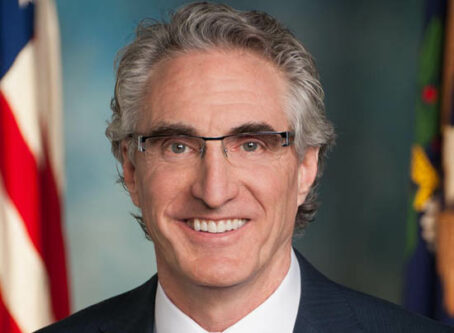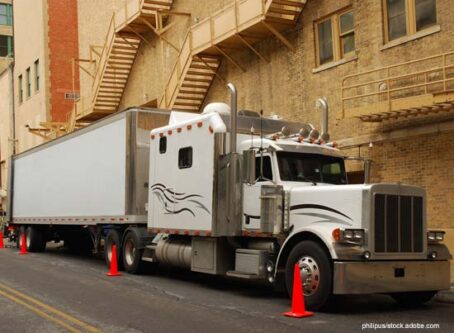Focus returns to truck-only tolls in Connecticut
The back and forth continues at the Connecticut statehouse as partisan plans for transportation funding return to a focus on truck-only tolls.
A transportation funding plan released earlier this month by Gov. Ned Lamont included a toll provision for many car and truck drivers. The Democratic governor’s plan was quickly shot down by members of his own party.
House Democrats this week, however, offered up a plan that includes trucks-only tolls.
Governor’s road funding plan
Gov. Lamont has been active his first year in office to end the state’s distinction as the lone New England state without any kind of tolling program.
Along the campaign trail Lamont touted a truck-only toll before revising his plan to include an all-electronic toll on all highway users.
He also originally wanted 80 toll gantries throughout the state. A cool reception to the idea among Republicans and some Democrats, as well as many constituents, spurred the governor to revise his plan to about a dozen gantries.
In hopes his concessions throughout the year would appease enough of the Democratic majority to get a toll component enacted, Lamont recently unveiled his updated transportation plan, called CT2030.
The 10-year, $21 billion plan was heavily reliant on tolls collected from car and truck drivers. Specifically, the plan called for adding tolls at 14 locations across the state.
The cheapest toll rate for large trucks would be $2.80.
Senate Democrats were immediately resistant to the toll idea. They swatted down Lamont’s plan.
House Democrats’ plan
Leading House Democrats in the statehouse share the sentiments of Senate Democrats on any effort to collect tolls from motorists. The idea to focus solely on commercial drivers, however, is favored.
The caucus is looking to collect truck-only tolls at 12 bridges around the state – two fewer than the governor’s plan to collect from all highway users.
Lamont has indicated he favors the House Democrats plan, which is very similar to the plan he favored during his campaign.
“A guiding principle of CT2030 is a dedicated revenue stream, which in large part comes from out-of-state drivers,” Lamont said in prepared remarks. “(The House Democrats plan) adheres to that basic principle, albeit to a lesser extent.”
Connecticut Republicans weary of toll talk
Republicans in the Connecticut Senate and House are opposed to any talk of toll collection.
House Minority Leader Themis Klarides, R-Derby, says Democrats have put themselves in a difficult spot on the issue.
“Had Democrats honored the dubious campaign pledge to only toll trucks and rolled that initiative out last winter, they might have had broader support within the legislature,” Klarides stated. “But there is a decided lack of trust as a result of the Democrats going back on their word and Connecticut residents and motorists have good reason not to support any tolling plan.”
Klarides added that her caucus will continue to fight efforts to implement the funding mechanism.
“We remain as committed as ever to no tolls in Connecticut because once the gantries are up and running it is only a flip of the switch and every motorist in the state will be tolled.”
House Republicans have yet to introduce a specific transportation funding plan.
Senate Republicans’ alternative to tolls
In the short window of time between the release of plans from the governor and House Democrats, the state Senate’s minority party unveiled their own plan.
The Senate GOP has released a 10-year, $18 billion alternative plan. The plan does not rely on car or truck tolls or new taxes. However, many of the same projects proposed by the governor are included.
Specifically, the Senate Republican’s “FASTR CT” plan relies on low-cost borrowing from the federal government to help cover expenses for road, bridge, rail, port and bus improvements. The governor’s plan includes the same borrowing component.
The big difference between the plans is the GOP’s reliance on “rainy day” funds to cover costs. Tapping the state’s budget reserves would allow the state to pay off pension liabilities to free up $130 million annually that could be used for transportation.
The state’s Special Transportation Fund also would be supported by a vehicle tax and $100 million in new annual state bonding.
“We do not need tolls or tax increases,” stated Sen. Henri Martin, R-Bristol. Instead, he says roads, rail and bridges can be improved by adopting smart fiscal policies, better managing state dollars and leveraging federal aid.
Next steps
Gov. Lamont has stated that he is appreciative of the attention that both parties are giving to transportation funding. He is encouraging both sides to meet with him to work out a deal quickly.
“I am recommending that all caucuses be prepared to bring these proposals to a meeting in my office as soon as possible.”
More Land Line coverage of news from Connecticut is available.









